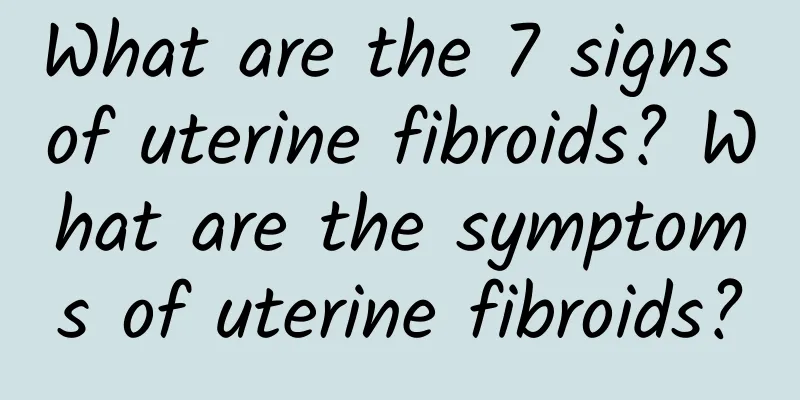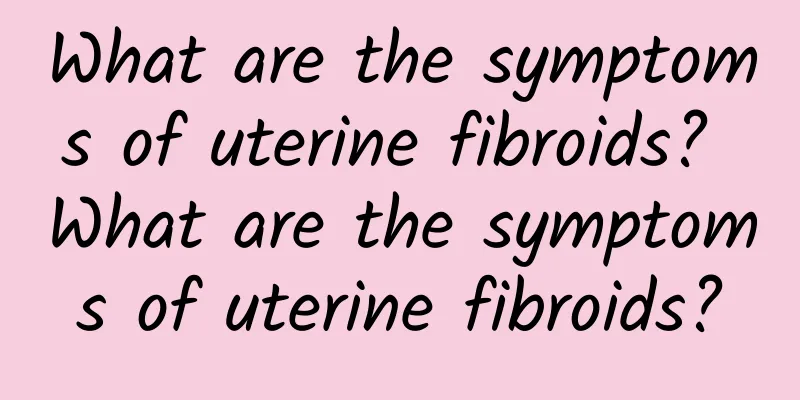What are the 7 signs of uterine fibroids? What are the symptoms of uterine fibroids?

|
Uterine fibroids are a common benign tumor in women, and their incidence is relatively high. For uterine fibroids, it is very important to understand its seven signs so that it can be discovered and treated in time. This article will introduce the symptoms and seven signs of uterine fibroids. Symptoms of uterine fibroids often include irregular menstruation, abnormal vaginal bleeding, pelvic pain, and difficulty urinating. Of course, symptoms may vary from person to person. However, the following are some of the more common symptoms of uterine fibroids. 1. Menstrual irregularities: Uterine fibroids may cause changes in the frequency and volume of menstruation. Some women may experience prolonged menstruation or heavy menstruation, while others may experience reduced bleeding during menstruation, or even cessation of menstruation. 2. Abnormal vaginal bleeding: Uterine fibroids can cause non-menstrual vaginal bleeding. This bleeding may occur outside the menstrual cycle and may last for a long time. Sometimes, this bleeding may be very serious and even require emergency treatment. 3. Pelvic pain: Some women may feel pain or discomfort in the pelvic area. This pain may be dull or stabbing and may be related to the location and size of the fibroids. 4. Difficulty urinating: When uterine fibroids are large, they may compress the bladder and cause difficulty urinating. Women may experience symptoms such as frequent urination, urgency, or inability to urinate completely. 5. Abdominal discomfort caused by compression: When uterine fibroids are large, they may cause a sense of compression in the abdomen. Women may feel abdominal distension, discomfort or compression. 6. Anemia: Due to abnormal bleeding caused by uterine fibroids, women may experience symptoms of anemia, such as fatigue, dizziness, and palpitations. 7. Difficulty in defecation: Sometimes, uterine fibroids may compress the rectum, causing difficulty in defecation. Women may experience constipation, abdominal pain, or other defecation problems. The above seven symptoms are one of the seven signs of uterine fibroids. Knowing these signs will help us detect the disease early and seek medical treatment in time. Uterine fibroids are a common disease among women, so it is important to understand the seven signs and other symptoms. If you experience irregular menstruation, abnormal vaginal bleeding, pelvic pain, dysuria, etc., it is recommended that you seek medical attention and undergo relevant examinations and treatments in a timely manner. However, everyone's physical condition may be different, so once the above symptoms appear, it is wiser to consult a doctor as soon as possible and get professional advice. After all, only a doctor can give a correct diagnosis and treatment plan. I hope this article can help readers better understand uterine fibroids, increase their awareness of the seven signs, and seek medical attention in a timely manner when faced with symptoms. Only when we actively pay attention to our physical health can we better prevent and treat diseases. |
>>: How to treat uterine fibroids? How to treat uterine fibroids?
Recommend
Can you eat salted chicken while losing weight? Nutritionists teach you how to eat without getting fat
For those who want to lose weight by eating out f...
Is it impossible to get pregnant if you have chronic adnexitis?
Is it impossible to get pregnant if you have chro...
What to do when uterine fibroids occur?
What should you do when uterine fibroids occur? U...
Get rid of obesity! Kaohsiung City People Challenge to Lose 85 Tons
Let’s all lose weight together in a healthy way! ...
What are the clinical manifestations of ectopic pregnancy?
Ectopic pregnancy is a common clinical disease. I...
What to do if pelvic effusion reaches 70 mm
Pelvic effusion is the presence of inflammatory e...
What to do if you don’t have your period?
What to do if you don’t have your period? The abs...
What are the essential drugs for treating hyperprolactinemia?
Hyperprolactinemia is also known as hyperprolacti...
Breaking the world record for cure rate of habitual abortion
The cure rate of habitual miscarriage is a concer...
A brief analysis of the postoperative care precautions for ectopic pregnancy surgery
For patients who choose ectopic pregnancy surgery...
Is it normal to have blood clots during menstruation?
Is it normal to have blood clots during menstruat...
Treatment of uterine fibroids The best treatment period for uterine fibroids
Uterine fibroids are the most disgusting disease ...
Symptoms of congenital absence of vagina
The symptoms of congenital absence of vagina must...
Will uterine fibroids cause miscarriage? What should I do if I have uterine fibroids?
In recent years, as people's pace of life acc...
What should I do if my period is delayed after medical abortion?
What should I do if my period is delayed after me...









